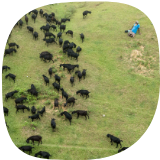OUR ACTION
A renewed
PVS Pathway
The competencies of Veterinary Services and the financing of their activities are essential to the success and sustainability of animal health policies, at the local and national level. However, the training and the human and financial resources of these Services are not always commensurate with the stakes involved. In this context, the OIE provides various programmes to improve their performance. The PVS Pathway is one of these mechanisms which has been renewed as part of the 6th Strategic Plan. An independent and in-depth evaluation of the functioning of Veterinary Services, this flagship programme allows to identify their strengths and areas for improvement, and to recommend solutions specifically adapted to each country. The new PVS Pathway enables, among other things, to better respond to countries’ needs by targeting, at their request, specific subjects, such as peste des petits ruminants, rabies or the fight against antimicrobial resistance.
In 2019, the OIE conducted 55 missions under the renewed PVS Pathway. Nigeria, which has been involved in several PVS activities since 2010, hosted a PVS Evaluation follow-up mission with a PPR Specific Content. Dr Olaniran Alabi, Chief Veterinary Officer and OIE national Delegate, comes back on the results of this mission.

“The PVS Pathway reports: tools for advocacy”
The report of the PVS Evaluation mission conducted in Nigeria allowed us to identify gaps and set up priorities for our Veterinary Services. It also served as an advocacy document with great success. We recently learned that the government was going to grant us financial support for the control of transboundary animal diseases and slaughterhouses upgrades. The report guided us to address specific shortcomings in our Veterinary Services. We recently created a national board for our Veterinary Statutory Body, after the PVS report helped us convince the government of its importance in coordinating actions nationwide. We are also involving veterinary paraprofessionals (VPPs) much more thanks to the PVS recommendations. We are registering them and engaging them in our activities to make sure best practices are used across the country, especially in remote areas where VPPs are the only animal health staff available.
A PVS mission with a specific content on Peste des petits ruminants
Our production system for small ruminants mainly consists in smallholder and semi-intensive farms. Village women are very much involved. It is an important source of livelihood for rural communities. The PPR component was therefore critical. It helped us advocate for better funds and gave us valuable information in support of the national PPR control and eradication plan.
